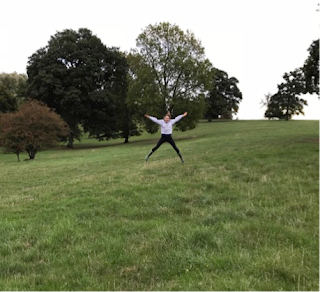(Sunday 9th December 2018)
Maggie is a qualified Gestalt practitioner (she won the British Gestalt Journal Essay Prize for 2015) and she believes in enabling humane change via the approaches she devises. Maggie is deeply empathetic and caring and is also highly analytical and systematic - she commenced her career as an IT programmer and worked for many years in the Public sector moving from a technical team leader to a business change specialist. It may come as a surprise that someone with such a background could write the beautiful and thought-provoking poem below that she has submitted for this year's Advent blog. However, those who know her will not be as astounded. She is a deep thinker (as well as a deep breather!) and believes in authenticity. Maggie is a warm and active voice on social media - you can connect with her on Twitter, her handle is @maggiermarriott.
Pink Floyd, Breathe
 |
| nine-tailed fox (九尾狐), is a mythical fox entity originating from Chinese mythology, that is a common motif in East Asian mythology with specific names in Japan, Korea and Vietnam. These mischievous foxes could shape shift (usually into the form of a beautiful woman). Nine-tailed fox (illustration comes from the British Museum and is a Chinese woodblock depicting a nine-tailed fox and a court lady, made circa 1849). The nine-tailed fox is depicted as a character in both League of Legends and Pokemon e-games. |
I am humbled by the various ways in which people respond to the Advent Blog's call to write on a theme and to have their words shared for the enjoyment and benefit of others. Each year I am amazed at the variety of was in which people respond. Today's post, by Maggie Marriott is a poem. It has a subtle message about self-care and awareness and yet is based around an activity that each of us does, often without thinking.
Maggie is a devoted mother and a generous friend. She runs her own business based in Gloucestershire, England, an organisational change consultancy ENKI that provides "balanced business wisdom". She specialises in supporting individuals and groups through desired transformation and is an effective coach - she has been the coach of choice for members of the civil service supporting the UK Government, helping effect transformation, especially in the areas of cyber security and assurance, and also for the National Crime Agency. She also works as a coach for Ambition School Leadership, providing support to the leaders of the future within Education, and for the Relational Change Organisation.
Maggie is a devoted mother and a generous friend. She runs her own business based in Gloucestershire, England, an organisational change consultancy ENKI that provides "balanced business wisdom". She specialises in supporting individuals and groups through desired transformation and is an effective coach - she has been the coach of choice for members of the civil service supporting the UK Government, helping effect transformation, especially in the areas of cyber security and assurance, and also for the National Crime Agency. She also works as a coach for Ambition School Leadership, providing support to the leaders of the future within Education, and for the Relational Change Organisation.
Maggie is a qualified Gestalt practitioner (she won the British Gestalt Journal Essay Prize for 2015) and she believes in enabling humane change via the approaches she devises. Maggie is deeply empathetic and caring and is also highly analytical and systematic - she commenced her career as an IT programmer and worked for many years in the Public sector moving from a technical team leader to a business change specialist. It may come as a surprise that someone with such a background could write the beautiful and thought-provoking poem below that she has submitted for this year's Advent blog. However, those who know her will not be as astounded. She is a deep thinker (as well as a deep breather!) and believes in authenticity. Maggie is a warm and active voice on social media - you can connect with her on Twitter, her handle is @maggiermarriott.
***********************************
Each life begins and ends with a breath and so does each
living moment. Becoming aware of the quality of each breath gives us clues
about how I and those around me are feeling. Is the breath being held or
released? Is the breath shallow or deep? Is the breath fast of slow? And from this awareness, choices appear. And
from choice anything is possible. And so my blog this year is a poem in
celebration of the breath of life and hope.
Every breath I
take - Hollows, hopes and high fives.
Breathing out
A hollowing
Releasing
Settling
Reflecting
Feeling
The pause
Holding
Waiting
For air again
Breathing in
A heightening
Learning
Connecting
Reaching
Moving
The pause
Holding
Waiting
For rest again
Every breath a moment of hope
Every pause a moment of choice
23,400 breaths a day
8,409,600 breaths a year
From the hollows and hopes of each breath I’m alive!
To my oft forgotten body I give a joyous high-five





























